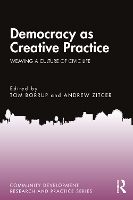


|
|
|
books
| book details |
Democracy as Creative Practice: Weaving a Culture of Civic Life
Edited by Tom Borrup, Edited by Andrew Zitcer

|
This book is currently unavailable. Enquire to check if we can source a used copy
|
| book description |
Democracy as Creative Practice: Weaving a Culture of Civic Life offers arts-based solutions to the threats to democracies around the world, practices that can foster more just and equitable societies. Chapter authors are artists, activists, curators, and teachers applying creative and cultural practices in deliberate efforts to build democratic ways of working and interacting in their communities in a range of countries including the United States, Australia, Portugal, Nepal, the United Kingdom, and Canada. The book demonstrates how creativity is integrated in place-based actions, aesthetic strategies, learning environments, and civic processes. As long-time champions and observers of community-based creative and cultural practices, editors Tom Borrup and Andrew Zitcer elucidate work that not only responds to sociopolitical conditions but advances practice. They call on artists, funders, cultural organizations, community groups, educational institutions, government, and others to engage in and support this work that fosters a culture of democracy. This book is intended for undergraduate and graduate students in the humanities and social sciences, activists, funders, and artists who seek to understand and effect change on local and global scales to preserve, extend, and improve practices of democracy.
| product details |
Normally shipped |
Publisher | Taylor & Francis Ltd
Published date | 1 Aug 2024
Language |
Format | Digital (delivered electronically)
Pages | 264
Dimensions | 0 x 0 x 0mm (L x W x H)
Weight | 0g
ISBN | 978-1-0401-0934-2
Readership Age |
BISAC | art / art & politics
| other options |
|
|
|
To view the items in your trolley please sign in.
| sign in |
|
|
|
| specials |
|
|
|
This first comprehensive biography of Cecil Rhodes in a generation illuminates Rhodes’s vision for the expansion of imperialism in southern Africa, connecting politics and industry to internal development, and examines how this fueled a lasting, white-dominated colonial society.
|
Look around you is anything real or normal any more? News, images and videos created by AI are everywhere.
|
|
|
|